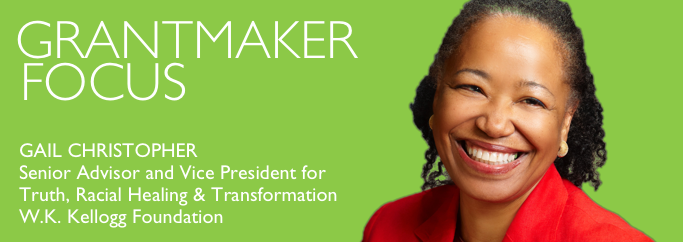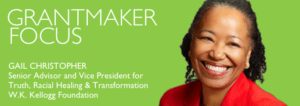
1 Michigan Avenue, East Battle Creek, MI 49017
Phone: 269.968.1611
Fax: 269.968.0413
Email: communications@wkkf.org
Web: www.wkkf.org
The W.K. Kellogg Foundation (WKKF) believes that every child deserves to reach their full potential. Its work, at its core, is about giving all children and families, regardless of race, ethnicity or income, the opportunity to thrive in school, in work, and in life.
This belief is rooted in the vision of its founder and breakfast cereal pioneer Will Keith Kellogg. When he established the foundation in 1930 he said: “Use the money as you please so long as it promotes the health, happiness and well-being of children.”
Today WKKF focuses its grantmaking on a child’s earliest years, from birth through the age of eight, because investing early has been proven to make the biggest difference in children’s long-term development. Working at the community level is central to the work of the WKKF. Like Mr. Kellogg, it believes in people – and that people and communities are the best source of ideas, wisdom, and solutions to create real change for children.
That is why, in addition to its work across the United States, WKKF concentrates two-thirds of its grantmaking in what it calls priority places. Its priorities for place-based grantmaking are: Michigan, Mississippi, New Mexico, and New Orleans, Louisiana, and internationally in Chiapas and the Yucatán Peninsula in Mexico, and Central and South Haiti.
Program Information: WKKF was among the first foundations to consistently frame its funding around health equity and the concept of social determinants of health. There is a lack of equity in opportunities for many children and families to achieve health and well-being. This is why the pursuit of racial equity and racial healing is fundamental to all of WKKF’s work, in addition to authentic community engagement efforts that help communities take on their toughest challenges.
Racism’s effects are evident in the social, economic, and government policies all around us and the places in which we live, learn, work, and play. People experience these effects – either positively or negatively – when they take their children to school, when they apply for jobs, when they try to rent or buy a home, when they shop, when they interact with the police, and more.
Exposure to racism, isolation, poverty, colonization, and segregation are all determinants of health and well-being. WKKF has come to understand that the main issue that undergirds our social condition is a legacy of racism and a false belief in a hierarchy of human value – a social construct that values one individual more than another based on skin color or other characteristics. Research has shown that as discrimination increases, blood pressure problems, mortality, coronary artery calcification, low birth weight, and other conditions also increase. This shows that health and racism are intrinsically linked and cannot be decoupled. We must address racism in order to achieve health equity.
- Financial Information:
Total Assets: $9.11 billion (FY15-16)
Amount Dedicated to Food, Health & Well-Being-Related Grants: $63 million in new commitments (FY15-16)
- Special Initiatives and/or Representative Health and Human Services Grants
Truth, Racial Healing & Transformation (TRHT) enterprise. A comprehensive effort, to be implemented beginning in 2017 community-by-community, to plan for and bring about transformational and sustainable change, to address the historic and contemporary effects of racism. (Multi-sectoral partnerships and grantmaking over time)Flint Water Crisis. Support to more than a dozen nonprofits and organizations supporting the work of Flint, Michigan’s recovery from the water and lead crisis and revitalizing the city to ensure a bright future for Flint children and families. The majority of WKKF grants are to organizations on the ground, based in Flint, while some national resources will bring knowledge and experiences to the community. ($7.1 million)
University of California-Berkeley. Enhance efforts to reduce infant mortality through the continued development of the Best Babies Zone model by strengthening the capacity and sustainability of initiatives focused on infant mortality, prematurity, and preterm birth. The Best Babies Zone model focuses on building communities that promote good health from one generation to the next, through positive life experiences and increased opportunities where we live, work, learn, and play, such as early childhood education, affordable housing, and a vibrant local economy. ($1.4 million)
First Nations Development Institute. Improve the health of Native children and benefit economic health of families and communities by advancing strategies to build and strengthen local and systemic food system infrastructure in Native American communities. ($2.95 million)
Northwest Portland Area Indian Health Board. Increase access to quality oral health care through exploring alternative workforce models. This project will lay the foundation for widespread accessibility of preventive dental care for children in American Indian communities through the use of mid-level dental care providers (Dental Health Aide Therapists) that can perform basic dental care and preventive procedures. ($2.96 million)
Most Pressing Health Issues in the Community
“We have all seen the power of isolation and disinvestment in entire communities due to racism. Only when we believe in our common humanity, rather than a hierarchy of human value, will we be able to achieve health equity for all.”
Gail Christopher, Senior Advisor and Vice President for Truth, Racial Healing & Transformation

